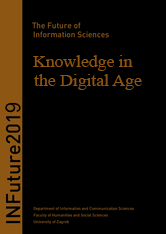7th International ConferenceThe Future of Information Sciences INFuture2019: Knowledge in the Digital Age
Synopsis
This is the seventh publication in the series of biennial international conferences, The Future of Information Sciences (INFuture) organised by the Department of Information and Communication Sciences, Faculty of Humanities and Social Sciences, University of Zagreb. Since its beginnings twelve years ago, the INFuture conference has been providing a platform for discussing both theoretical and practical issues in information organization and information integration through the explorations of how developments in information and communication technology influence the future of the field of information sciences. Education and research in information sciences and its interdisciplinary scope and application is of particular interest to this conference which is aimed at researchers and professionals from the broad field of information and communication sciences and related professions. The title of this year's conference is INFuture2019: Knowledge in the Digital Age. The conference explores the influence the information and communication sciences have on the society as a whole.The INFuture2019 conference consists of 26 papers from 58 authors from nine countries -Austria, Croatia, Germany, Netherlands, Norway, Slovenia, South Korea, Sweden and United States.
Chapters
-
Preface
-
Language in the age of dataism
-
Quantitative analysis of adjectives in the Russian literary corpus of realism and romanticism
-
Croatian web dictionary – mrežnik vs. Croatian linguistic terminology – Jena
-
Enhancing encyclopedic characteristics using geotagging:why it matters?
-
A corpus-based approach to reevaluation of Croatian verb classification
-
Can societal impact of scientific work be measured in the process of re-accreditation of higher education institutions and public scientific institutes in Croatia?
-
Intergenerational knowledge sharing in business settings:a comparative case study between Germany and South-Korea
-
Event-based modelling of a major historical government source:Ministerratsprotokolle 1848–1918
-
The intermesh of records management principles and Enterprise Architecture:a framework for Information Governance in the Swedish context
-
Digital preservation of electronic records in the Croatian State Archives, U.S. National Archives and Records Administration and Library and Archives Canada:the importance of education of information specialists
-
Data quality in the context of longitudinal research studies
-
Evaluation of a MOOC to promote information literacy:first evaluation results
-
Using LMS activity logs to predict student failure with random forest algorithm
-
Music information seeking behaviour among the students of Humanities and Social Sciences at the University of Osijek
-
Automated phonetic transcription of Croatian folklore genres using supervised machine learning
-
Arabic speakers as Croatian language learners:electronic educational games as a support for learning
-
Learning Japanese script through storytelling and multimedia
-
Gamification in e-lexicography
-
Entrepreneurship and service learning of students of information sciences and informatics
-
Information and communication technology in the rehabilitation of hearing-impaired children
-
Media freedom and regulation in the context of reporting on national security issues
-
Open Source Intelligence (OSINT):issues and trends
-
The role of new media in building social skills of students with and without disabilities
-
The usage of social media for higher education purposes
-
Software visualization in education
-
How to measure digital literacy?:a case of Croatian adult learners
-
Reviewers
Downloads

